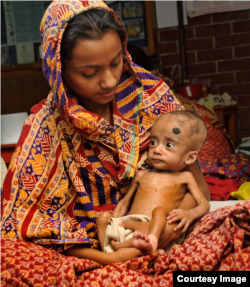Inside every one of us, trillions of microbes are busy in our intestines.
They help extract nutrients from the food we eat. But that colony of bacteria and other organisms can be damaged by malnutrition, and a study of children in South Asia indicates the damage can last even after the child is treated.
Malnutrition is one of the leading health challenges facing young children in developing countries.
Death rates are down, thanks in part to super-nutritional food therapies — such as Plumpy’Nut — and programs to treat malnourished kids. But microbiologist Jeffrey Gordon of Washington University in Saint Louis says malnutrition has long-term consequences.
“Stunting, problems with immune function, [and] reductions in IQ persist, despite these therapeutic interventions,” said microbiologist Jeffrey I. Gordon, MD, of Washington University in Saint Louis. “And the question is, why?”
Children who go through a period of malnutrition may be at a permanent disadvantage.
In a new study in Bangladesh, Gordon and his colleagues used DNA to study the intestinal microbes, also called the microbiota, which normally change — or “mature” — as a child gets older.
They found that children who were undernourished had immature microbiota, even after getting the standard therapy of antibiotics and food supplements.
“The therapeutic food caused them to gain weight, but it didn’t affect the state of maturity of their microbiota,” he said.
Gordon thinks reversing the effects of malnutrition requires not just healthy food but also a gut full of healthy, mature microbes.
“Whether healthy growth is possible with this immaturity, we don’t think so,” he said.
A lot of work stands between this study and better treatments for malnutrition, which might include supplements containing “good” bacteria, along with improved therapeutic foods.
But the first author of the paper, Washington University MD-PhD student Sathish Subramanian, says he and his colleagues are encouraged by the results of their research.
“This gives us hope that through this study and others to come, that we will better understand the variation of microbiota structure across different children, across varying nutritional status, and possibly across different geographies,” he said.
The research paper by Supramanian, Gordon, and their colleagues is published online in Nature.
They help extract nutrients from the food we eat. But that colony of bacteria and other organisms can be damaged by malnutrition, and a study of children in South Asia indicates the damage can last even after the child is treated.
Malnutrition is one of the leading health challenges facing young children in developing countries.
Death rates are down, thanks in part to super-nutritional food therapies — such as Plumpy’Nut — and programs to treat malnourished kids. But microbiologist Jeffrey Gordon of Washington University in Saint Louis says malnutrition has long-term consequences.
“Stunting, problems with immune function, [and] reductions in IQ persist, despite these therapeutic interventions,” said microbiologist Jeffrey I. Gordon, MD, of Washington University in Saint Louis. “And the question is, why?”
Children who go through a period of malnutrition may be at a permanent disadvantage.
In a new study in Bangladesh, Gordon and his colleagues used DNA to study the intestinal microbes, also called the microbiota, which normally change — or “mature” — as a child gets older.
They found that children who were undernourished had immature microbiota, even after getting the standard therapy of antibiotics and food supplements.
“The therapeutic food caused them to gain weight, but it didn’t affect the state of maturity of their microbiota,” he said.
Gordon thinks reversing the effects of malnutrition requires not just healthy food but also a gut full of healthy, mature microbes.
“Whether healthy growth is possible with this immaturity, we don’t think so,” he said.
A lot of work stands between this study and better treatments for malnutrition, which might include supplements containing “good” bacteria, along with improved therapeutic foods.
But the first author of the paper, Washington University MD-PhD student Sathish Subramanian, says he and his colleagues are encouraged by the results of their research.
“This gives us hope that through this study and others to come, that we will better understand the variation of microbiota structure across different children, across varying nutritional status, and possibly across different geographies,” he said.
The research paper by Supramanian, Gordon, and their colleagues is published online in Nature.










